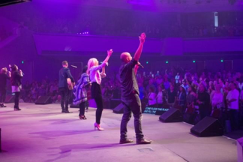
Revival gatherings led by evangelical worship leader Sean Feucht across the country have gathered thousands of Christians and are seen by some as fueling “a new Jesus Movement,” write Meagan Clark and Haeven Gibbons in Religion Unplugged (October 24, 2020). The writers hasten to add that the audience for the group Let Us Worship looks quite different from that of the spiritual seekers of long-gone hippie times. Still, some participants see the current revival as something similar for our days, and Feucht himself claims to “want that in my generation.” Feucht has close relationships with the popular Pentecostal Bethel Church in California, but is no longer a member of its staff, and unsuccessfully ran for Congress as a Republican last year. Coming at a time of civil unrest and COVID-related restrictions, the gatherings are called “worship protest” at those places (e.g. Seattle) where outdoor gatherings have not been permitted. “Feucht has built himself into a symbol of the enormous frustration felt by some religious Americans…over Covid regulations,” writes Julia Duin in a portrait of the musician and missionary in Politico (October 25, 2020). Clark and Gibbons remark that there have been similar outdoor gatherings aiming at a revival by less prominent ministries and capitalizing on the current hardships at other places across the country in recent months.
Feucht is eager to denounce current restrictions and has launched an online petition on his website, stating that “States across America… have  shut down church services and even outlawed singing in church.” He charges that “Instagram and Twitter is censoring Christian voices every single day.” In late October, Feucht led three days of prayer, fasting, street ministry and worship in Washington D.C. Clark and Gibbons analyze the movement as an answer to several issues, beside the protest against restrictions and the emphasis on religious freedom even in times of pandemic. Quoting from a recent Barna survey, they note that a very high percentage of Christian Millennials had stopped participating in church online during the pandemic last Spring, partly because they do not feel attracted by a passive church experience, and that this may accelerate a decline of Christianity in the young generation in the US. There is also a perceived need for the church to evolve at a critical time and calls for a revival seems to be popular these days. (Sean Feucht’s website is: https://www.seanfeucht.com)
shut down church services and even outlawed singing in church.” He charges that “Instagram and Twitter is censoring Christian voices every single day.” In late October, Feucht led three days of prayer, fasting, street ministry and worship in Washington D.C. Clark and Gibbons analyze the movement as an answer to several issues, beside the protest against restrictions and the emphasis on religious freedom even in times of pandemic. Quoting from a recent Barna survey, they note that a very high percentage of Christian Millennials had stopped participating in church online during the pandemic last Spring, partly because they do not feel attracted by a passive church experience, and that this may accelerate a decline of Christianity in the young generation in the US. There is also a perceived need for the church to evolve at a critical time and calls for a revival seems to be popular these days. (Sean Feucht’s website is: https://www.seanfeucht.com)